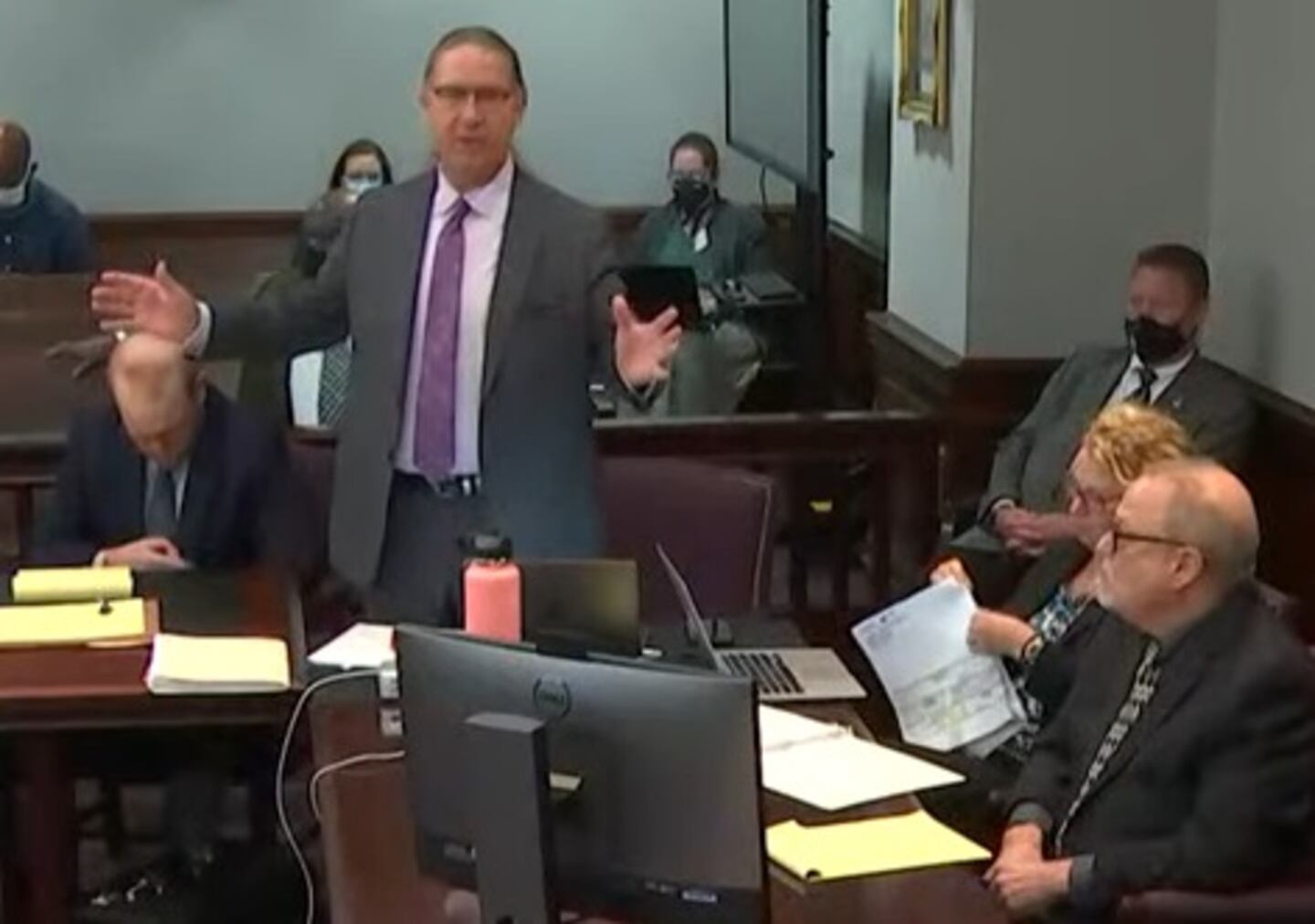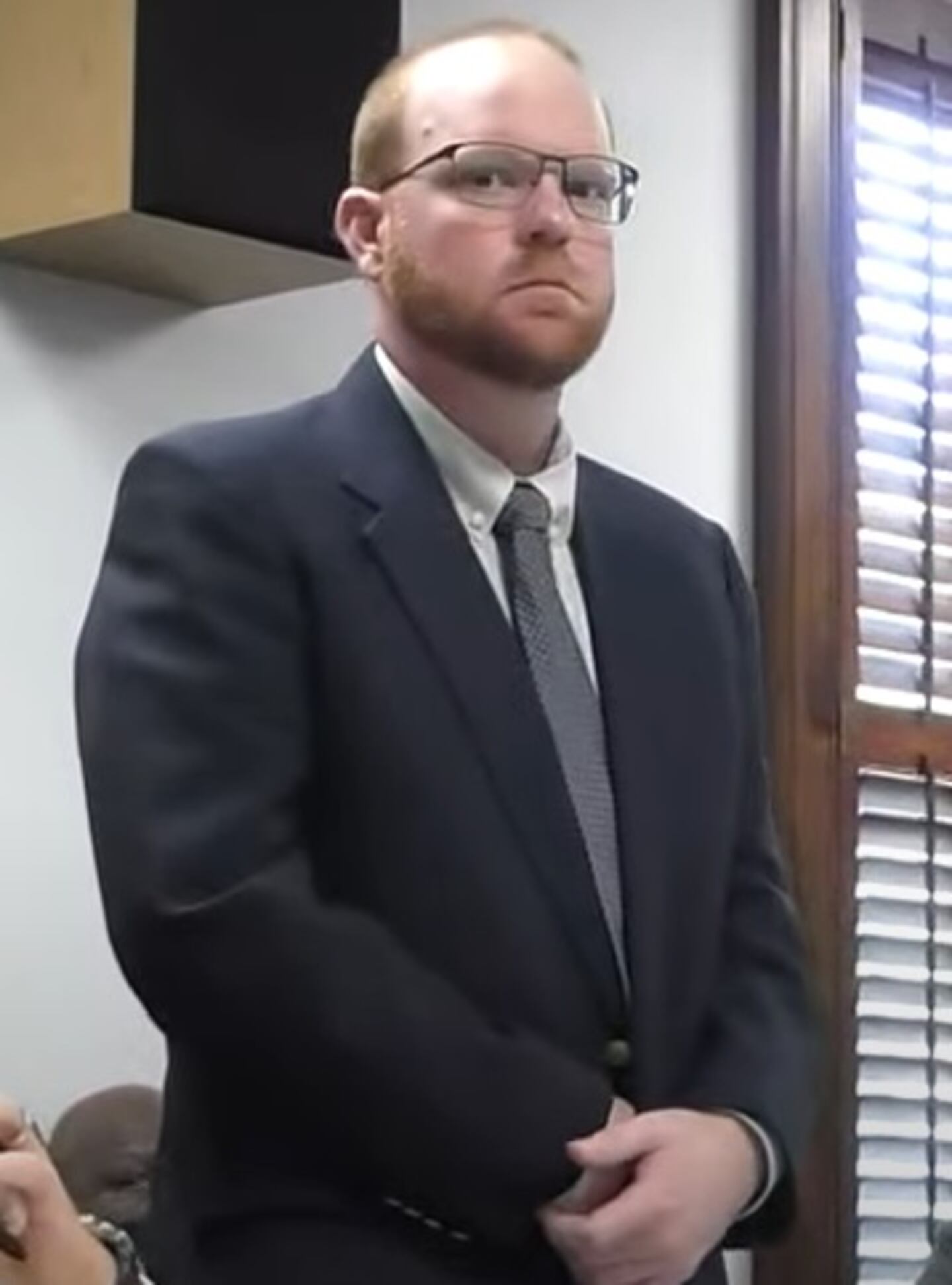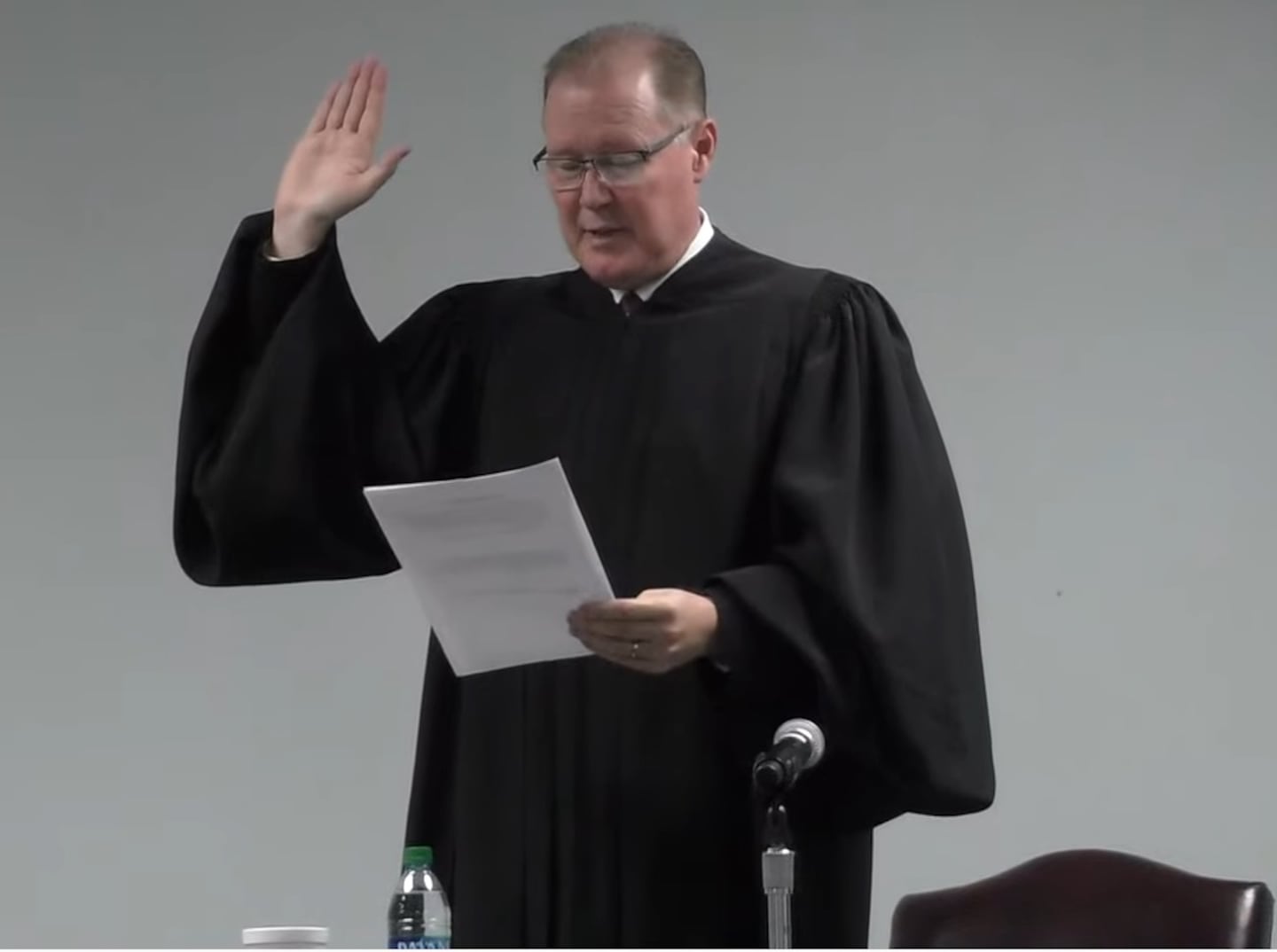In the #AhmaudArbery shooting case, six more jurors have been qualified for the pool, bringing the total to 42 out of the needed 62. They are Jurors 558, 567, 571, 575, 579, and 580. @wsbradio pic.twitter.com/qVVknFZOI5
— Veronica Waters (@MissVWaters) October 27, 2021
5:05 PM: It’s been an efficient day. Several jurors were struck for cause along the way based on hardships and exemptions, like age and not wanting serve, or being a full-time caregiver. Late this afternoon, one juror asked to leave the courtroom and didn’t seem to ever make it back inside; there was some question about whether Juror #584 may’ve been having a panic attack.
Juror #584 had undergone brief questioning, including a query about whether he has a religious conviction about this case.
“I don’t think its right,” he said. “I just think it would be hard to get past and look past some things. Its not socially. It’s a religious thing and moral thing.”
He’d also indicated a possible distraction at home and work. He explained that his mother passed away just two months ago. He was asked about his concerns around his safety and reputation if put on the case: “It’s a lot of people I know at work and stuff. Just people around the neighborhood.”
At that point, he asked to leave. He didn’t return. There was a motion to strike him to cause and no objections.
Today, several people said they can consider the evidence even a former lawman who says he doesn’t agree with the citizen’s arrest law. They’ve just qualified another half-dozen for the panel...bringing the total number to 42 now. They need 64.
Qualified today: Jurors 558, 567, 571, 575, 579, and 580.
Juror #580, W/F. No opinion on #AhmaudArbery shooting case or its defendants: "I don’t have time to watch the news or listen to it. I don’t know much about the case." If chosen, she'd have concern: "It's about people finding out I was a juror & harassing me afterward" @wsbradio
— Veronica Waters (@MissVWaters) October 27, 2021
Juror #579, W/F. She's heard opinions about the #AhmaudArbery shooting case, which she takes with a grain of salt. She can hold the State to its burden of proof, look at evidence in court. "I'm a rules follower. I can separate opinion from facts," she says. @wsbradio pic.twitter.com/OBZjs0pwAQ
— Veronica Waters (@MissVWaters) October 27, 2021
4:00 PM: Juror 571 appears to be a white woman, and says: “I feel like they’re guilty. All of them.” Saw video of Arbery’s shooting approximately three times. But says, “I believe that I can listen to evidence and maybe change my opinion.” One coworker graduated with Travis McMichael; another is friends with his sister.
Juror #571 says she and those two coworkers have not had any in-depth conversations about this, just casual mentions when it came up in the news.
Does she have an opinion about race in this case?
“If I’m honest, if it was completely reversed, and if the three men were black and the victim were white, they would be arrested immediately,” No. 571 opines.
The defense also asked her about writing on her jury questionnaire that the three men racially-profiled Ahmaud Arbery.
She explains, “From what I’ve read, there were derogatory statements made over Ahmaud Arbery’s body after he was shot. Do I know I that that was true? No. But I have heard that has happened. In my mind. that would be reason to conclude this he was racially profiled.”
“How do you unring that bell?” asked Bob Rubin, lawyer for Travis McMichael.
“Well, I just said I’m not positive it was true.”
She added, “I am open to the evidence.”
Does Juror 571 have an opinion about race in this case? “If I’m honest, if it was completely reversed, and if the three men were black and the victim were white, they would be arrested immediately,” she opines. #AhmaudArbery @wsbradio pic.twitter.com/EYglH8DPis
— Veronica Waters (@MissVWaters) October 27, 2021
3:25 PM: Juror #567 appears to be a white man; he has law enforcement experience, saw video on the news, and “It didn’t look good.” Yes, he can hold State to its burden of proof, consider only court evidence, follow the law.
Juror 567's asked about concerns around safety/rep/livelihood. “Just being out there & having my face on TV,” he says, having seen people "hounded" before. About #AhmaudArbery video, saw maybe 6 or 8 seconds. Is 6-8 seconds far from the whole story?, defense asks. "Yes" @wsbradio pic.twitter.com/AldH9RFsGB
— Veronica Waters (@MissVWaters) October 27, 2021
2:40 PM:
Juror #566, B/M. From the #AhmaudArbery "video and everything else," he views defendants negatively. “I don’t know what could have led up to that, but to me, he was just running, getting exercise.” Set that aside for the trial? “To me, I already have my mind made up.”@wsbradio
— Veronica Waters (@MissVWaters) October 27, 2021
2:00 PM:
#AhmaudArbery shooting case jury selection: #565, W/F, friends with the 2nd person who responded to shooting scene. Hasn't talked with her about it. Knows a lot of law enforcement socially. Has seen video 3-4 times. Opinion? “I do believe the McMichaels to be guilty.” @wsbradio
— Veronica Waters (@MissVWaters) October 27, 2021
Juror #565 believes chase videographer Roddie Bryan is "also guilty." She is asked, Do you think you have all the facts of this case?
— Veronica Waters (@MissVWaters) October 27, 2021
“I don’t think anyone would necessarily, but just based on the video I’ve seen, I believe my beliefs would be unchanged.” #AhmaudArbery @wsbradio
1:00 PM: Two Juror 562 coworkers might be jurors? witnesses? here. He says they didn’t discuss opinions/feelings about this: “We try not to do that at work.” Asked to write them down, he doesn’t know their last names.
Defense asked him if a crime was committed.’? “I’m not qualified to determine a crime,” he replies. No. 562 says he’s not already made up his mind. But asked if he’d consider citizen’s arrest, self-defense claims, says, “Not in this context…from what I know, this was all handled inappropriately”
Defense asks Juror 562, Do you have an opinion that they're guilty of a crime? “Uh, I’m conflicted...Well on the one hand, I wouldn’t have tracked him down with a shotgun & a sidearm & I certainly wouldn’t have sat there and videotaped it & not called 911" #AhmaudArbery @wsbradio pic.twitter.com/SRdRlbZdSF
— Veronica Waters (@MissVWaters) October 27, 2021
12:25 PM: Another potential juror mentions knowing about Ahmaud Arbery’s jogging habit.
There was a joint motion to strike three jurors for statutory reasons this morning: age over 70. Law says they are exempt if they don’t want to serve.
Juror #562 appears to be a white man; he recognizes the name of a witness in the case whom he “used to know.” He has experience in the medical field and in emergency medicine. He said on his questionnaire he has “limited knowledge” of this case. He’s watched the video three or four times on his phone.
Did that cause you to form an opinion of guilt?
“Yes. I wouldn’t have done it like that,” says #562. “I wouldn’t have grabbed a gun and go chasing down the street. First thing would have been to call 911, and let authorities handle it.”
Says he can hold the State to its burden of proof and listen to the law given by judge, fairly consider defense arguments, and base a verdict on those things. About the video, he says, “You can’t unsee what you saw.”
He has spoken to friends and family about the case. One told him where Ahmaud Arbery lived, and said “He jogs past all the time.”
Juror #562 is another juror who knows or has heard something about #AhmaudArbery being a regular jogger. In talking to friends and family about the case, one told him where Arbery lived, and said, “He jogs past all the time.” @wsbradio pic.twitter.com/oQpdO5I2tb
— Veronica Waters (@MissVWaters) October 27, 2021
10:45 AM: “Revolt.” That’s the word from Roddie Bryan attorney Kevin Gough, as individual voir dire was about to get underway. He’s asking the Court to expedite the removal-for-cause for jurors already who are improbable to be seated for statutory exemptions, like being over age of 70 and not wanting to serve. They’re here with nothing to do. “Felt like a bunch of jurors got around the coffee machine and suddenly decided they couldn’t serve, couldn’t be fair.”
He says, “It’s being discussed in the community about jurors being here all day when everybody knew by 10:00 that they were never going to serve.
“We’re going to have a revolt from the jury pool if we don’t find a way to deal with them more expeditiously,” added Gough.
“The Court does not rush for the sake of rushing,” says Judge Walmsley, who says they are moving the process along as expeditiously as possible. He says jurors have a way to submit affidavits beforehand about statutory exemptions and he says either they didn’t realize the information is there, or they want to serve. Walmsley says if they show up, it is “inappropriate to assume that they don’t want to serve.” He won’t act sua sponte to just yank them out of the jury pool. He respects the time it’s taking to do this.
“I hope that the community, given that the community has been--information about this case has been out there for a year and a half, that the State and the defense and the Court want to and need to be very deliberate so that at the end of the process, a fair, unbiased, and impartial jury can be seated, and will listen to the evidence and render a fair and just verdict, no matter what that verdict is. I apologize for folks who believe that we are taking up too much of their time, but one would hope we all can see the bigger picture here, and respect the process.”
Greg McMichael attorney Frank Hogue asks if they can start at 8:30 in the morning, with whoever is gathered, instead of waiting for late jurors. We learned that the judge was ready to begin at 8:30 today, but waited on latebirds. Hogue says to treat the late jurors like late jurors and put them off for another day.
“I acknowledge they may be calling in and saying, ‘I’m almost at the courthouse’ and what have you, but...” says Hogue.
Judge interrupts him and says we can’t just keep moving people because they might be a little bit late. He says there will be reminders sent to the panelists, though.
“I’m ready to start at 8:30 and get done earlier,” chuckles Hogue. The judge says they’re going to keep things as is.
“We’ve burned more time talking about things in here than we did waiting on the juror to appear,” says Judge Walmsley. “We had one who was late enough to be asked to come in and they were there within 10 minutes of the request.”
“So the motion is denied?” asks Hogue.
“It’s a MOTION?” asked the judge.
Hogue says there are usually at least 16 in the courthouse by 8:30 and that’s when he wants to begin.
Judge again says we’re going to keep things as they are. “Court starts at 8:30. My expectation is the panel is here at 8:30 and the Court will assume there are full panels to select from.
“Are we NOW ready to get started?”
State and Defense say, “Ready, Your Honor.”
Judge: “All right. 557.”
At about 10:30, Travis McMichael attorney Jason Sheffield opens proceedings with a concern about potential appellate proceedings. He wants to make sure they can tighten up the record, and is asking the judge to make stated responses to his opinion, to tighten up the record, not only offering a verbal “sustained.”
“How do we ensure that what we say and understand from the Court gets placed into the record, so that if we lose this case, we can argue on appeal that either we were not ineffective, or where we might share the opinion on appeal that the Court failed to exercise discretion?” asks Sheffield. “We mean no disrespect to the Court. But when we start saying we don’t understand the Court’s ruling, we are asking that the State makes an objection and a reason, so we create a ruling, and we know what it is based on.”
Judge: “I’m not going to engage in the way that Counsel has attempted me to engage. I have tried to explain my rulings but with potential jurors present, especially for pre-judging objections, that counsel will be flexible instead of engaging and telling the Court what they heard to mold the Court’s ruling into some additional ruling.” He says he indicated yesterday with Gough that we was not going to engage in the back-and-forth.
“It’s the nature of the proceedings,” says Judge Walmsley. “The back and forth and getting the last word, the Court will not engage in that.”]
10:15 AM: The panel voir dire is done. We’re in a 10-minute recess.
Asked if they had negative opinions about the defendants, more than half the panel raised their hand for each one: by my count, it was 15 for Travis McMichael, 14 Gregory McMichael, and 12 for William “Roddie” Bryan.
9:15 AM: Superior Court Judge Timothy Walmsley is on the bench in the jury assembly room on Day 7 of jury selection in the Ahmaud Arbery shooting case. He welcomed the jurors, swore them in, and asked the statutory questions. Twelve people say they’ve already formed an opinion on guilt or innocence.
©2021 Cox Media Group












